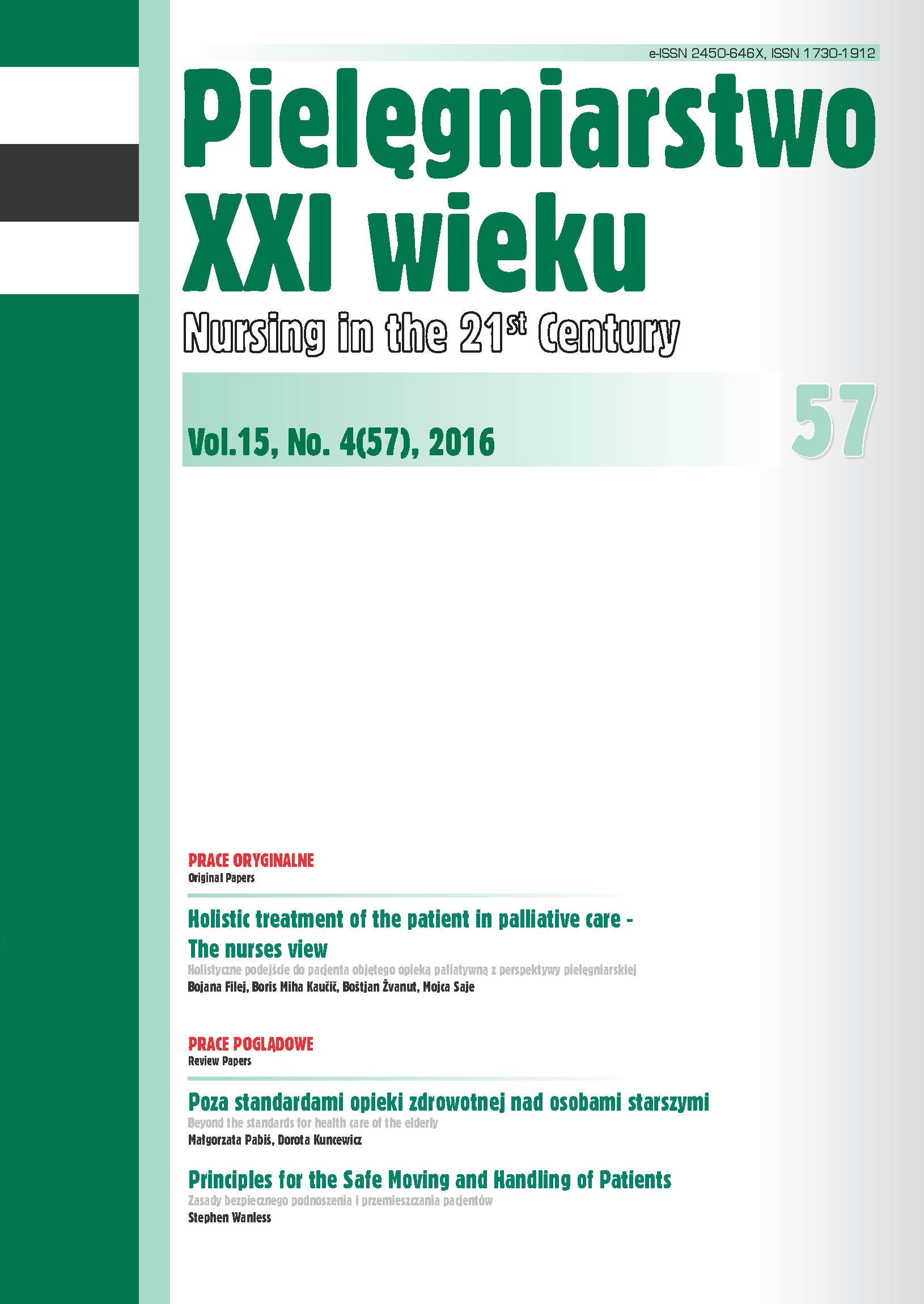Children immunization – knowledgeand attitudes of parents
DOI:
https://doi.org/10.1515/pielxxiw-2016-0032Keywords:
immunization, children, parents, knowledge, attitudesAbstract
CHILDREN IMMUNIZATION – KNOWLEDGE AND ATTITUDES OF PARENTS
Aim. The aim of the study was to investigate parents’ knowledge and attitudes towards compulsory immunization of their children.
Material and methods. The research was conducted with the survey questionnaire among 110 randomly chosen parents aged 18-40 whose infants were inpatients at the University Children’s Hospital in Lublin.
Results. The study revealed that parents were poorly informed about the age of the first vaccination of their infant, compulsory and recommended vaccines, combined vaccines, contraindications for vaccination and adverse reactions following immunization. More than 50% of the parents had a rather positive attitude towards vaccination. However, one fifth admitted that they had seen campaigns which presented immunization of children as harmful. The most popular opinion among the respondents was that compulsory and recommended vaccinations for children should be given only against the most dangerous diseases. The majority of parents considered vaccinations to be safe and only a small percentage of parents were against immunizing their children due to possible health complications. Most of the parents were willing to immunize their children with all the compulsory vaccines and only several recommended ones (as they are not free of charge). Many of them declared they would choose combined vaccines.
Conclusions. Attitudes of parents towards immunization of children varied in the studied group. We concluded that parents were generally poorly informed about immunization of infants. The fact that knowledge about vaccinations may influence parents’ future decisions to protect their children against numerous infectious diseases calls for intensified education on the subject.
References
1. Tymińska J, Wysocki J. Oszacowanie potrzeb edukacyjnych rodziców w zakresie szczepienia przeciwko pneumokokom na przykładzie wybranego gabinetu lekarza POZ [Estimating educational needs of parents regarding pneumococcal vaccination on the example of a GP practice]. Nowa Pediatria. 2015; 19(3):102-108.
2. Majda-Stanisławska E, Sicińska J, Kuc A. Czy rezygnacja ze szczepień pneumo-kokowych jest bezpieczna? [Is it safe to opt out of pneumococcal vaccination?]. Forum Pediatrii Praktycznej. 2016; 10:51-56.
3. Kochman D, Rudzińska T. Znaczenie edukacji rodziców w kontekście szczepień [The importance of educating parents on vaccination]. Problemy Pielęgniarstwa. 2008;16:163-172.
4. Pirogowicz I, Kuchar E, Steciwko A. Szczepienia zalecane – optymalizacja postępo-wania wobec chorób infekcyjnych. [Recommended vaccinations – optimising the treatment of infectious diseases]. Family Medicine&Primary Care Review. 2006; 8(3):1046-1052.
5. Pokorna-Kawałek D, Mastalerz-Migas A, Steciwko A. Szczepienia zalecane w praktyce lekarza rodzinnego [Vaccinations recommended in the practice of a GP]. Terapia. 2010; 2:63-68.
6. Tarczoń I, Domaradzka E, Czajka H. Co na temat szczepień ochronnych wiedzą rodzice i pracownicy ochrony zdrowia [What parents and healthcare professionals know about immunization]. Przegląd Lekarski. 2009; 66:27-33.
7. Grzesiowski P. Szczepienia dla całej rodziny. Obowiązkowe szczepienia dla dzieci. [Immunization for the whole family. Compulsory immunization of children]. Lekarz. 2008; 9:98-107.
8. Wysocki J.: Postępy w dziedzinie szczepień ochronnych w 2008 roku [Developments in immunization in 2008]. Medycyna Praktyczna – Pediatria. 2009; 02:45-52.
9. Kuchar E, Szenborn L. Postawy antyszczepionkowe i możliwości polemiki [Anti-vaccination attitudes and possibilities for discussion]. Przewodnik Lekarza. 2010;05:43-46.
10. Szenborn L., Czajka H., Wysocki J. Kontrowersje wokół szczepień [Controversies over vaccinations]. Przegląd Lekarski. 2009; 1-2:65-70.
11. Kochman D, Rudzińska T. Analiza przyczyn decyzji rodziców o poddaniu szczepieniom dzieci w wieku 0-2 lat [Analysing the reasons behind parents’ decision to have their children vaccinated at the age 0-2]. Pediatria Polska. 2008; 83:357-362.
12. Murkowicz J. Szczepienie przeciwko rotawirusom [Rotavirus vaccine] Medycyna Praktyczna. 2015;1 special issue: 3-23.
13. Majda-Stanisławska E. Choroby wywołane przez meningokoki w Polsce – charakte-rystyka i opis przypadków klinicznych [Meningococcal diseases in Poland – cha-racteristics and description of clinical cases]. Pediatria Polska. 2009; 5:488-491.
14. Huppertz HI, Salman N, Giaquinto C. Risk factors for severe rotavirus gastroenteritis. Pediat Inf Dis J. 2008; 27(supl.):11-19.
15. Hjuler T, Wolhlfart J, Kaltoft MS. Risks of invasive pneumococcal disease in children with underlying chronic diseases. Pediatrics. 2008; 122:26-32.
16. Vesikari T, Karvonen A, Prymula R. Efficacy of human rotavirus vaccine against rotavirus gastroenteritis during the first 2 years of life in European infants: randomized, double-blind controlled study. Lancet. 2007; 370:1757-1763.
17. Vestrheim DF, Lovoll O, Aaberge IS. Effectiveness of a 2+1 dose schedule pneumococcal conjugate vaccination programme on invasive pneumococcal disease among children in Norway. Vaccine. 2008; 26:3277-3281.
Published
Issue
Section
License
Copyright (c) 2016 Authors

This work is licensed under a Creative Commons Attribution-NonCommercial-NoDerivatives 3.0 Unported License.




